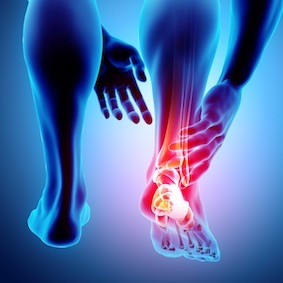What exactly are Achilles tendon injuries?
The Achilles tendon is a cord that connects the power of the calf muscles to the heel bone. This connection forms the basis of our walking-mechanism. If too much stress is put on the Achilles tendon during exercise, (small) tears can appear in its fibrous band of tissue. Wearing wrong shoes or an accidental stumble can also cause damage to your Achilles tendon. You’ll either feel pain in your lower calf where the tendon and muscle tissue meet, in the tendon and its surrounding tissue itself or in the bursa which is located at the back of your heel between the Achilles tendon and the heel bone. Achilles tendon injuries usually develop gradually over time.
Common Achilles tendon complaints and symptoms
Pain at the top of your heel bone when you get up in the morning could be a sign of a damaged Achilles tendon. During your first bare footed steps you Achilles will feel painful. Initially, this pain will only last for a little while. Sometimes, the Achilles tendon looks red and swollen. There are five different stages of pain as a result of physical exercise:
- Pain starting right after a long workout, lasting for a couple of hours after which it spontaneously disappears.
- Pain during your warm-up, fading during the exercise and returning afterwards
- Pain during and immediately after the workout and at night as well; only subsiding after a long period of rest.
- Similar to nr. 3 but including a sharp drop of performance level.
- A constant pain which does not improve, not even after a long period of rest.
Achilles tendon injuries incidence and who does it affect?
Achilles tendon injuries are most likely to occur at sports that require explosive and jumping movements (such as badminton or athletics) or prolonged strain such as walking or running. Adequate footwear and a thorough warm-up and cool-down during exercise are essential. Factors that can increase the risk of Achilles tendon injuries are: tight or stiff calf muscles, leg-length discrepancy, exercising on hard surface (such as concrete or asphalt), a monotonous exercise regime or increasing the intensity of your exercise too quickly. Finally, chronic (long-term) Achilles tendon issues are more likely to happen to men, aged 30 and over, than to women.
Self-help for Achilles tendon injuries
There are many measures you can take to prevent the injury from getting worse, especially in the early stages when you have only just started to feel pain.
- Apply ice to your Achilles tendon for about 15 minutes right after you’ve noticed the injury. Massage the area around the injury with an ice cube or place your leg on a chair with an ice pack or bag of ice underneath your Achilles tendon. Wrap the ice pack in a tea towel so you won’t damage the skin. Repeat this process three to five times a day.
- Check your footwear; are your shoes worn out, do they still offer support, have they lost their firmness and stability? Consider buying a new pair to prevent damage through exercise strain.
- Avoid or adjust an exercise routine that puts stress on your tendon, to make sure a possible onset of a tendon injury is given plenty of time to fully recover. Try and find different types of exercise to keep fit, such as cycling or aqua jogging.
- Have your calf muscles massaged when they feel stiff/tight.
- In case you don’t notice any improvement after four or five weeks you should seek advice from a GP or physiotherapist, specialised in sport and exercise medicine.

Physiotherapy treatment for Achilles tendon injuries
Achilles tendon injuries are easy to mend. If you seek treatment in an early stage, you’re likely to recover quickly and fully. Sixty percent of people with minor Achilles tendon injuries will be pain free within ten to twelve weeks. A (sports) physiotherapist can help you to, for instance, regain Achilles tendon flexibility. You will also need to carry out some exercises unassisted. A physiotherapist can also suggest an exercise program aimed at strengthening your calf muscles and Achilles tendon, as well as recommending suitable exercises and adequate foot wear. After Achilles tendon surgery, a physiotherapist could be indispensable too by, for instance, planning a balanced approach aimed at improving muscle strength and increasing your fitness level.
Which other physical complaints does FysioCity treats?
Book an appointment
 NL
NL